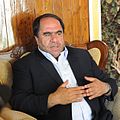Governors of Panjshir Province
| Picture | Governor | Time in office |
|---|---|---|
 | Hajji Bahlol | 2005 – 21 April 2010 |
 | Keramuddin Keram | 21 April 2010 – 2 November 2013 |
 | Abdul Rahman Kabiri | 2 November 2013 – 6 June 2015 |
 | Muhammad Arif Sarwari | 6 June 2015 – 2017 [1] |
 | Kamaluddin Nezami | 2017 – 6 September 2021 [2] [3] [4] |
 | Qudratullah Panjshiri | 8 September 2021 – June 2022 |
 | Mohammad Nasim Noori | June 2022 – May 2023 |
 | Mohammad Agha Hakim | May 2023 – Present [5] [6] |
